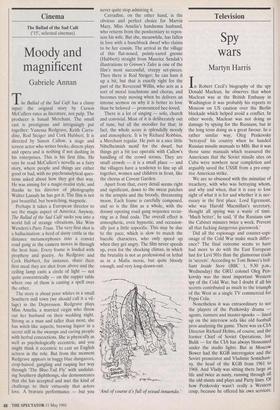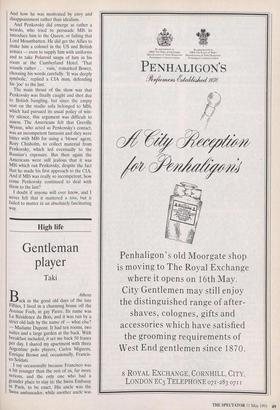Television
Spy wars
Martyn Harris
In Robert Cecil's biography of the spy Donald Maclean, he observes that when Maclean was at the British Embassy in Washington it was probably his reports to Moscow on US caution over the Berlin blockade which helped avoid a conflict. In other words, Maclean was not doing us damage by spying for the Russians, but in the long term doing us a great favour. In a rather similar way, Oleg Penkovsky `betrayed' his country when he handed Russian missile manuals to MI6. But it was those same manuals which reassured the Americans that the Soviet missile sites on Cuba were nowhere near completion and arguably saved the USSR from a pre-emp- tive American strike.
We are so obsessed with the minutiae of treachery, with who was betraying whom, and why and when, that it is easy to lose sight of what it is for and whether it is nec- essary in the first place. Lord Egremont, who was Harold Macmillan's secretary, thought all spying was a waste of time. `Much better', he said, If the Russians saw the Cabinet minutes twice a week. Prevent all that fucking dangerous guesswork.'
Did all the espionage and counter-espi- onage of the Cold War make much differ- ence? The final outcome seems to have had more to do with the East European lust for Levi 501s than the glamorous trade in `secrets'. According to Tom Bower's bril- liant Inside Story (BBC 1, 9.30 p.m., Wednesday) the GRU colonel Oleg Pen- kovsky was the most important Western spy of the Cold War, but I doubt if all his secrets contributed as much to the triumph of the West as a single TV commercial for Pepsi Cola. Nonetheless it was extraordinary to see the players of the Penkovsky drama agents, runners and master-spooks — lined up on the interview sofa like old football pros analysing the game. There was ex-CIA Director Richard Helms, of course, and the former Chief of Soviet Operations, Joe Bulik — for the CIA has always blossomed under the studio lights. But in Moscow Bower had the KGB interrogator and the Soviet prosecutor and Vladimir Semichast- ny, the head of the KGB from 1961 to 1968. And Vlady was sitting there large as life and twice as nasty, running through all the old stunts and plays and Party lines. Of how Penkovsky wasn't really a Western coup, because he offered his own services.
And how he was motivated by envy and disappointment rather than idealism.
And Penkovsky did emerge as rather a weirdo, who tried to persuade MI6 to introduce him to the Queen, or failing that Lord Mountbatten. He did get the Allies to make him a colonel in the US and British armies — even to supply him with uniforms and to take Polaroid snaps of him in his room at the Cumberland Hotel. 'That sounds rather . . . vain,' remarked Bower, choosing his words carefully. 'It was deeply symbolic,' replied a CIA man, defending his 'joe' to the last.
The main thrust of the show was that Penkovsky was finally caught and shot due to British bungling, but since the empty seat on the studio sofa belonged to MI6, which had pursued its usual policy of win- try silence, this argument was difficult to assess. The Americans felt that Greville Wynne, who acted as Penkovsky's contact. was an incompetent fantasist and they were bitter with MI6 for using a 'blown' agent, Rory Chisholm, to collect material from Penkovsky, which led eventually to the Russian's exposure. But then again the Americans were still jealous that it was MI6 which ran Penkovsky, despite the fact that he made his first approach to the CIA. And if MI6 was really so incompetent, how come Penkovsky continued to deal with them to the last?
I doubt if anyone will ever know, and I never felt that it mattered a toss, but it failed to matter in an absolutely fascinating way.



























































 Previous page
Previous page